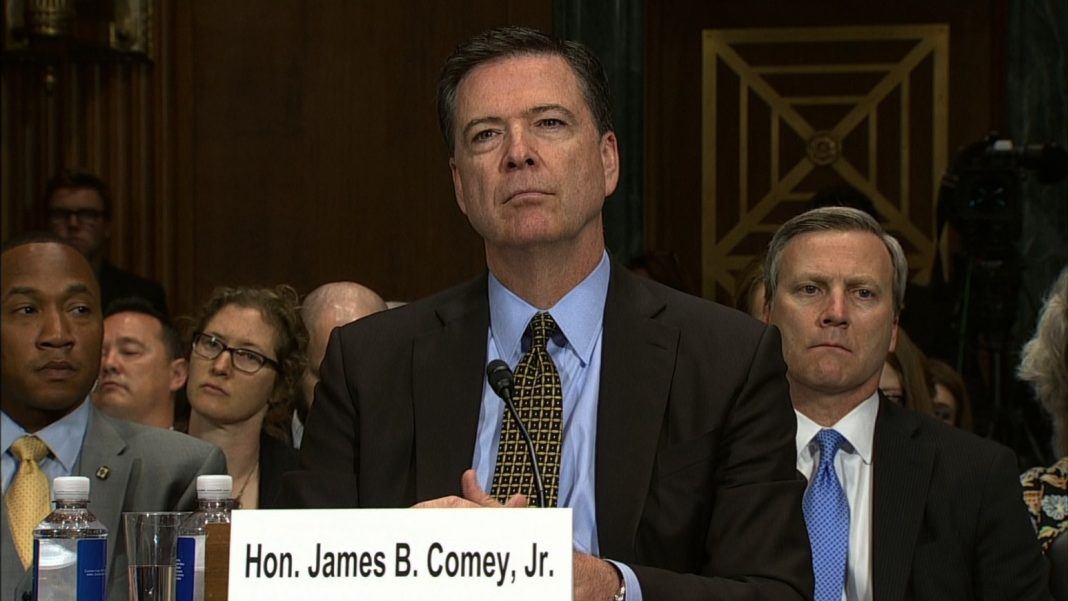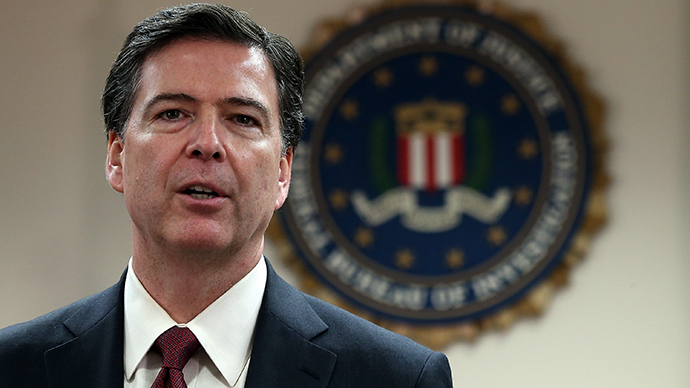
James Comey knows how to perform during a Congressional hearing and on Thursday, the fired FBI Director will be disputing President Donald Trumps’ version of their conversations.
In his letter to Comey firing him, Trump raised the Russia investigation and asserted that: “…I greatly appreciate you informing me, on three separate occasions, that I am not under investigation.” The White House has not provided details of when those three conversations allegedly took place.
It’s not such a surprise as Trump has been finding every way to trash him possible, much to the Republican Party’s chagrin. Everything from claiming that Comey assured him three times that he wasn’t personally under investigation to have attack ads running on television. Of course, Trump didn’t personally do the ads; a super PAC took care of that for him.
In Trump’s world, he always has a different interpretation of events from others, even if they were also there. Right now, he believes that his supporters hate Comey, so he feels that he’s justified in fighting dirty and trying to attack his opponent.
Comey, on the other hand, is finally having his say, and he is the type that knows how to say it and say it well.
Anticipation has built for Comey’s Congressional hearing; even DC bars have created their own Comey cocktails and people are even tweeting about watch parties and where to go. It’s a true popcorn event, and you can be sure, ratings will be quite high for this one. Naturally, Trump has said that he plans on giving a speech during this time, but he’ll be frustrated more when he looks at the ratings for the two.
So, that leaves the DC parlor game of what will Comey say and what won’t he be able to because of the ongoing FBI investigation? Here’s the breakdown heard inside and outside the White House.
Just What Jawdropping Things Will James Comey Say?
Friends and associates of the former FBI director described Comey as shocked that news of his firing came from a television screen, while he was speaking to agents in California last month. Just three years into a 10-year-term, Comey’s associates said he had no inkling he was on the verge of losing his job, especially not while the Bureau was in the middle of investigating Russian interference in the 2016 presidential contest.
Comey did, however, have an uneasy feeling about President Trump, friends said. This year, he chronicled his conversations with Trump in a series of contemporaneous memos. One reflected his concern about Trump’s alleged request to back off from the investigation of his former national security adviser Michael Flynn. Comey also told associates the president had tried to get him to pledge “loyalty” on multiple occasions this year, a pledge the FBI director declined to make.
The White House has changed its public rationale for firing Comey, first blaming his mishandling of the Hillary Clinton email probe and pointing to recommendations from leaders at the Justice Department. But then the president told an interviewer he got rid of Comey because of “this Russia thing.” And the New York Times went on to report Trump had told Russian officials in the Oval Office the day after the dismissal that Comey was a “nut job” and firing him had “taken off” pressure over his campaign’s contacts with Russia.
Of course, the opposite happened. Comey’s dismissal triggered the deputy attorney general to appoint a special counsel to investigate Russian interference.
What Topics James Comey will avoid
The fired FBI director has been in contact with the special counsel, who happens to be his predecessor at the FBI, Robert Mueller III. Comey may testify about his confidence that Russian hackers targeted American institutions last year, but he’s expected to steer clear of details about the ongoing Russia investigation in his hearing before the Senate Intelligence Committee. Legal experts said that makes sense, because as a former prosecutor, Comey understands he should not take steps to complicate the ongoing criminal probe.
So, don’t get your hopes up for a discussion about retired Lt. Gen. Michael Flynn’s request for immunity, the fate of Trump’s former campaign manager Paul Manafort or what the former FBI director knows about meetings between Trump’s son-in-law Jared Kushner and Russia’s ambassador last year. Comey may be more willing to discuss his dealings with Attorney General Jeff Sessions, who backed the White House decision to fire him.
Comey’s Greatest Moments
There’s a reason why people are eager to hear Comey tell his side of the story. For a man who’s spent most of his adult life pursuing law and order, he’s an unusually vivid communicator.
People sat up and listened when he likened the influence of Islamic State social media accounts on young Western recruits to “a devil on their shoulder all day long saying, ‘kill, kill, kill.'”
Reporters and congressional aides still recall, from memory, exact passages from Comey’s 2007 congressional testimony about racing up the steps of a hospital to interdict George W. Bush White House officials seeking to bypass him in a surveillance dispute and get to the ailing attorney general, John Ashcroft.
He once blamed the FBI’s challenge in recruiting cyber talent on its prohibition on marijuana use. “I have to hire a great workforce to compete with those cyber criminals, and some of those kids want to smoke weed on the way to the interview,” he said. Comey later clarified that was a joke after then-Sen. Jeff Sessions, R-Ala., offered criticism.
Some of his greatest hits are memorable for other reasons. Days before he was fired, Comey told lawmakers he was “mildly nauseous” about the idea his actions in the Clinton email probe may have swayed the 2016 presidential election.
Washington DC knows how to give a tense party and an even tenser Congressional hearing – even Titanic ones.
Dramatic congressional hearings are something of a Washington art form, a rite of democracy carefully crafted for the cameras.
Suspense is building as fired FBI Director James Comey prepares to claim the microphone Thursday in an austere, modern hearing room of the Hart Senate Office Building. He is to testify about his dealings with President Donald Trump and the FBI’s investigation into the Trump campaign’s connections with Russia.
A look at past high-drama hearings:
ELEVEN HOURS
Former Secretary of State Hillary Clinton’s marathon grilling before the House Select Committee on Benghazi in October 2015 was her moment – an extremely extended one at that – to push back against critics’ suggestions that her State Department failed to protect U.S. diplomats in Libya before the 2012 attack that killed four Americans. In hours of sometimes testy testimony, Clinton, by then front-runner for the Democratic presidential candidate, said it was “deeply unfortunate” that the Benghazi attacks were being “used for political purposes.” Asked how it felt to be accused of contributing to the deaths of four Americans, she said softly, “I imagine I’ve thought more about what happened than all of you put together. I’ve lost more sleep than all of you put together.”
HE SAID, SHE SAID
The 1991 Senate confirmation hearings for Supreme Court nominee Clarence Thomas will forever be remembered for the lurid accusations of sexual harassment leveled by a young former subordinate, Anita Hill. From the witness table, Hill described what she said were Thomas’ unwanted sexual advances toward her. Both Thomas and Hill withstood withering and painfully detailed questions from members of the all-male Judiciary Committee. He described the hearings as a “high-tech lynching.” She later said senators should apologize for “their malicious indictment of me.”
RAISE YOUR HAND
When Marine Lt. Colonel Oliver North, his chest brimming with medals, stood and raised his right hand to be sworn in at a 1987 Senate hearing, it became the enduring image from the Iran-Contra scandal, a covert arms-for-hostages overture to Iran. In six days of testimony before a Senate panel, North commanded the spotlight as he insisted his superiors had authorized all of his actions. “I came here to tell the truth, the good, the bad and the ugly,” he said. “I am here to tell it all.” A jury later found North guilty of three felonies, but an appeals court reversed his convictions, finding the case relied too much on testimony he gave to Congress under an immunity deal.
WATERGATE’S CANCER
Americans were glued to their TVs in the summer of 1973, when North Carolina Sen. Sam Ervin presided over the Watergate hearings. It was here that Nixon aide Alexander Butterfield revealed the existence of the White House taping system that contained the evidence that ended Nixon’s presidency. And here that former White House counsel John Dean said he’d told Nixon there was “a cancer growing on the presidency” and revealed that Nixon had approved plans to cover up the break-in at Democratic National Committee headquarters.
THIS IS WAR
In 1966, Sen. William Fulbright launched “educational” hearings by the Senate Foreign Relations Committee aimed at heading off a buildup of U.S. forces in Vietnam. Retired generals and respected foreign policy analysts were among the witnesses who testified in the same caucus room where the Titanic and Army-McCarthy hearings had been held in earlier decades. The hearings helped produce a shift in public opinion by “making it respectable to question the war,” according to a Senate historical account.
“HAVE YOU NO SENSE OF DECENCY?”
Wisconsin Sen. Joseph McCarthy’s anticommunist campaign led to the Army-McCarthy hearings in the spring of 1954 that included an outburst from Boston lawyer Joseph Welch when McCarthy got particularly aggressive. “Let us not assassinate this lad further, senator,” Welch declared in the televised hearing. “You have done enough. Have you no sense of decency?” With that, McCarthy’s reign of fear collapsed.
BIG GAMBLE
The 1950 assassination of a gambling kingpin in Kansas City led to a special Senate investigation into organized crime chaired by Tennessee Sen. Estes Kefauver. The committee visited 14 major cities in 15 months, “like a theater company doing previews on the road” before heading for Broadway, according to a Senate historical account. When gambler Frank Costello refused to testify on camera in New York, the committee agreed not to show his face, and cameras instead showed his “nervously agitated hands, unexpectedly making riveting viewing,” the Senate post recounted. The Associated Press wrote at the time: “Something big, unbelievably big and emphatic, smashed into the homes of millions of Americans last week when television cameras, cold-eyed and relentless, were trained on the Kefauver Crime hearings.”
TEAPOT TEMPEST
This one looked to be a snoozer. The Senate in 1922 set out to investigate a secret deal involving the interior secretary and a lease for the U.S. naval petroleum reserve at Wyoming’s Teapot Dome. The inquiry looked to be so tedious that a junior member of the minority, Montana Democrat Thomas Walsh, was named chairman. But the hearings uncovered shady dealings that made Albert Fall the first former cabinet officer to go to prison and turned Walsh into a national hero, according to an account posted on the Senate’s website.
TRULY TITANIC
In April 1912, a special Senate subcommittee investigating the sinking of the Titanic met first at New York’s Waldorf-Astoria Hotel, then in the new caucus room of the Russell Senate Office Building. In all, 82 witnesses testified about ice warnings ignored, life boat shortages and other failings. The hearings ended with Sen. William Smith of Maine heading back to New York to interview crew on the Titanic’s sister ship, Olympic. The hearing transcripts stretched to 1,100 pages, and were reprinted in 1988 after the movie “Titanic” piqued public interest.


